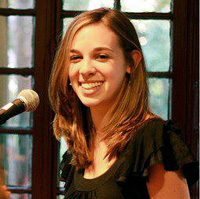 Rachel R. Taube is pursuing her MFA in Fiction at UNC Wilmington. She has been an Electric Literature-Catapult Scholarship recipient and a Tent Creative Writing Fellow, and she holds a masters in Creative Writing and Gender Studies from the University of Pennsylvania. You can find her fiction in Storychord and Apiary Magazine. Follow her on Twitter at @racheltaube.
Rachel R. Taube is pursuing her MFA in Fiction at UNC Wilmington. She has been an Electric Literature-Catapult Scholarship recipient and a Tent Creative Writing Fellow, and she holds a masters in Creative Writing and Gender Studies from the University of Pennsylvania. You can find her fiction in Storychord and Apiary Magazine. Follow her on Twitter at @racheltaube.
RACHEL R. TAUBE INTERVIEWS ROS SCHWARTZ, TRANSLATOR OF TRANSLATION AS TRANSHUMANCE

A Conversation with Ros Schwartz translator of TRANSLATION AS TRANHUMANCE by Mireille Gansel from Feminist Press at CUNY Interview by Rachel R. Taube Ros Schwartz has been a literary translator for 36 years and has been an active participant in the evolution of the profession. She has translated over 70 books from French to English by writers as diverse as Moroccan author Tahar Ben Jelloun and French crime writer Dominique Manotti, as well as Antoine de Saint-Exupéry’s The Little Prince. She has presided as vice-chair of the Translators Association, as chair of the European Council of Literary Translators Association and as chair of English PEN’s Writers in Translation program. Most recently Schwartz translated Translation as Transhumance, which was reviewed by Cleaver. In this interview, Ros Schwartz discusses the process of translating a book about translation, including her work with Gansel, her theory of translation, and translation as activism. Rachel R. Taube: In another interview, you said Translation as Transhumance is a unique project for you because you championed the book and found a publisher for it. What about the original made you decide that you needed to translate this book? Ros Schwartz: My response to reading the French original was visceral, like falling ...
TRANSLATION AS TRANSHUMANCE, a book-length essay by Mireille Gansel, reviewed by Rachel R. Taube
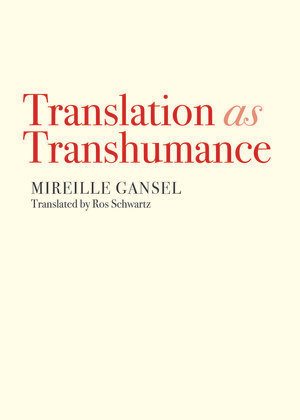
TRANSLATION AS TRANSHUMANCE by Mireille Gansel translated from the French by Ros Schwartz Feminist Press at CUNY, 112 pages reviewed by Rachel R. Taube For Mireille Gansel, the work of translation is an all-consuming task. Before embarking on a project, Gansel first immerses herself in the world of the poet she is translating. She studies the historical context of their writing as well as the personal context. Wherever possible, she engages with their physical environment: she visits their home, observes their writing space. And, ideally, she listens to the poet read their work aloud. Attempting to translate a single German word, “sensible,” in a poem by Reiner Kunze, Gansel travels from West to East Germany to “[listen] to the poet read, alert to his intonations and facial expressions. In the tiny blue kitchen, I was conscious of his precarious everyday life.” She imagines the letters from friends in exile that he’ll never receive, and the mingling of his two languages, a German abstracted by Nazism and a Czech repressed by war, both of which survive in the poetry of his contemporaries, in songs from his childhood. Here, in this intersection of past and present, Gansel finds the word for “sensible”: ...
ISLAND OF POINT NEMO, a novel by Jean-Marie Blas de Roblès, reviewed by Rachel R. Taube
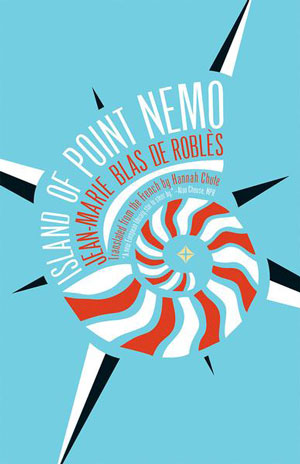
ISLAND OF POINT NEMO by Jean-Marie Blas de Roblès translated from the French by Hannah Chute Open Letter Books, 450 pages reviewed by Rachel R. Taube Island of Point Nemo is a fast-moving adventure story featuring murderers, romance, and preternatural turns. But dig further into those turns, and the novel is ultimately a eulogy to books, both as physical objects and as containers for fiction. Written by Jean-Marie Blas de Roblès and newly translated from French by Hannah Chute, Island of Point Nemo features suspenseful plotlines that intertwine in such a way as to make the reader question the natures of fiction, reality, and history. This is Blas de Roblès’ ninth book and his second to be published in English. The philosophy-professor-turned-novelist’s prize-winning first book to appear in English, Where Tigers Are at Home, arrived relatively quietly in the U.S., but received positive reviews from Kirkus and NPR, which praised it as “a challenge to readers who want their fiction to offer a quick pay-off.” Island of Point Nemo, too, rewards patience, and despite some failings of tone, it is an unpredictable ride that successfully plays with form to develop its themes. The primary plotline is an ...
TRYSTING, fiction by Emmanuelle Pagano, reviewed by Rachel R. Taube
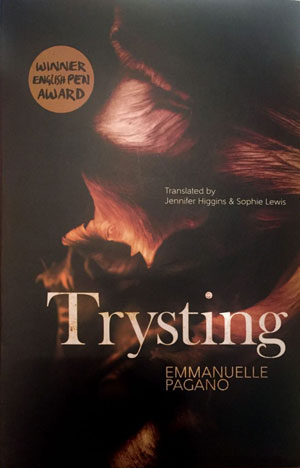
TRYSTING by Emmanuelle Pagano translated from the French by Jennifer Higgins and Sophie Lewis Two Lines Press, 154 pages reviewed by Rachel R. Taube Emmanuelle Pagano’s Trysting is an intimate romance among hundreds. This book of fictional fragments, each in the first person, features character after character—most of indeterminate gender, age, and history—falling in and out of love. The self-contained pieces range from one sentence meditations to several hundred word flash fictions. The shortest of these could be writing prompts, while others read as prose poems. Reading Trysting can, in fact, be like reading a book of poetry, and it benefits from slow, thoughtful study. You could linger over any one piece, reread it and taste the rhythm, the carefully chosen words. The deliberate and emotionally dense Trysting is representative of the kind of writing that earned Pagano the European Union Prize for Literature and translation into a dozen languages. But this is the first time Pagano has been published in English, and Jennifer Higgins’ and Sophie Lewis’ interpretation is a piece of art in its own right. Though they lose some nuances of expression and must forfeit some of the clarity of the French, Higgins and Lewis successfully reimagine ...
WORM-DIRT by Rachel Taube
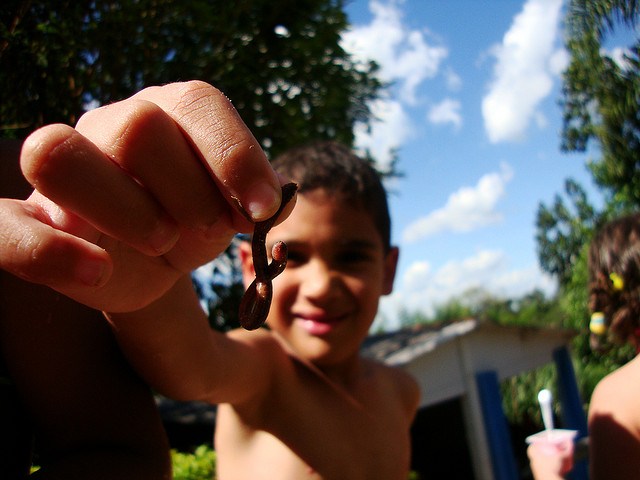
Rachel R. Taube
WORM DIRT She found me digging up worms in my backyard. Just plopped down beside me and started wriggling herself when I found one in the freshly turned soil. Later, her mother was angry about the worm dirt on her dress, but she came back the next day. “My name is Mara,” she said this time. What a pretty name on her lips, she smiled just a little on the “ar” and I saw her dimples. Her lips were pink like a worm. “This one’s name is Cara-Beth,” she said, pointing. She named each worm we found: Mariel, Nathaniel, Courtney. She wouldn’t touch them, but demanded I house each in a plastic cup, which we then placed in the shade. Digging them up, they dry up. When one died, she would say, “Poor Cara-Beth” and hand me the emptied cup, ready for the next worm. If you cut off the head of a worm, it doesn’t hurt it, my teacher explained. Each end just keeps squirming away. When I told Mara, she squealed with delight. She said we had to try it. She dared me and double-dog-dared me, and still I held my twig over the wriggling body, ...
WORM DIRT She found me digging up worms in my backyard. Just plopped down beside me and started wriggling herself when I found one in the freshly turned soil. Later, her mother was angry about the worm dirt on her dress, but she came back the next day. “My name is Mara,” she said this time. What a pretty name on her lips, she smiled just a little on the “ar” and I saw her dimples. Her lips were pink like a worm. “This one’s name is Cara-Beth,” she said, pointing. She named each worm we found: Mariel, Nathaniel, Courtney. She wouldn’t touch them, but demanded I house each in a plastic cup, which we then placed in the shade. Digging them up, they dry up. When one died, she would say, “Poor Cara-Beth” and hand me the emptied cup, ready for the next worm. If you cut off the head of a worm, it doesn’t hurt it, my teacher explained. Each end just keeps squirming away. When I told Mara, she squealed with delight. She said we had to try it. She dared me and double-dog-dared me, and still I held my twig over the wriggling body, ...
